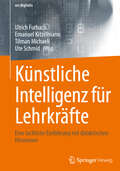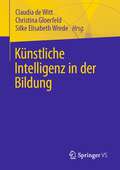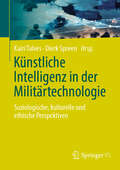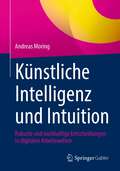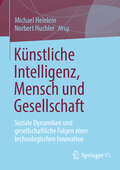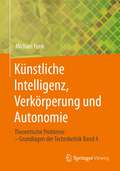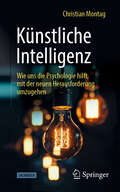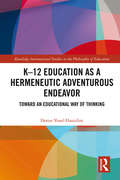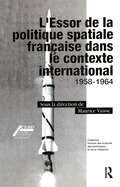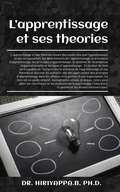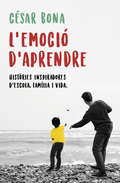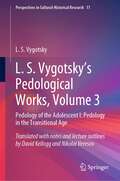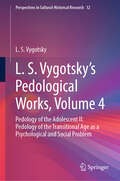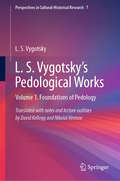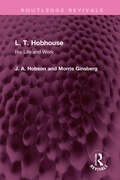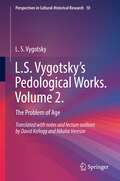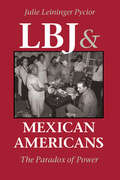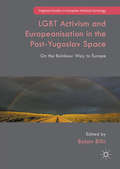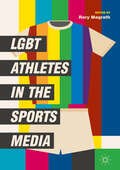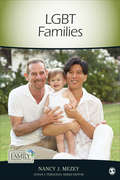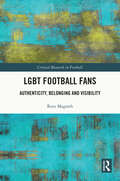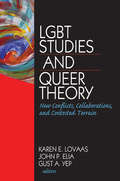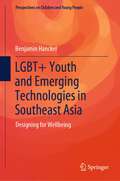- Table View
- List View
Körperoptimierung: Selbstverbesserung zwischen Steigerungsdruck und Leibgebundenheit (Frankfurter Beiträge zur Soziologie und Sozialpsychologie)
by Julia SchreiberDie Ansprüche an die Optimierung des Körpers in spätmodernen westlichen Gesellschaften scheinen in einem Spannungsverhältnis zu stehen zum Leib als jener Dimension des Körperlichen, die auf eine konstitutive Unverfügbarkeit und Begrenztheit verweist. Die vorliegende Arbeit geht diesem Spannungsverhältnis nach, indem sie anhand von narrativ-biografischen Interviews die Vermittlung von gesellschaftlichen Anforderungen und individuellen Praktiken untersucht. Aufgezeigt wird dabei, dass sich die Verdrängung des Leiblichen gerade auch deshalb zunehmend zu normalisieren scheint, weil sie mit bestimmten sozialen und psychischen Bedeutungen versehen ist. Vor diesem Hintergrund werden die Folgewirkungen von Körperoptimierungen, aber auch das Widerstands- und Transformationspotenzial des Leiblichen diskutiert.
Künstliche Intelligenz für Lehrkräfte: Eine fachliche Einführung mit didaktischen Hinweisen (ars digitalis)
by Ulrich Furbach Ute Schmid Emanuel Kitzelmann Tilman MichaeliDas Buch Künstliche Intelligenz für Lehrkräfte führt die zentralen Ansätze und Gebiete der KI fundiert und insbesondere für Informatiklehrkräfte aufbereitet ein. Es bietet aber auch Lehrkräften mit anderem Hintergrund die Möglichkeit, sich mit den fachlichen Grundlagen von KI auseinanderzusetzen. Behandelte Themen sind insbesondere Problemlösen und Suche, Grundlagen des Maschinellen Lernens, Wissensrepräsentation und Schließen, Künstliche neuronale Netze, Tiefes Lernen, Generative KI und Robotik. In jedem Kapitel wird eine methodische Einführung gegeben, relevante Anwendungsbereiche aufgezeigt und Vorschläge für die konkrete Umsetzung im Unterricht gegeben. Zudem werden interdisziplinäre Bezüge hergestellt und Fragen der Ethik und gesellschaftliche Bezüge diskutiert.Die Herausgebenden und Autor:innen des Buches sind Lehrkräfte an Hochschulen aus den Bereichen Künstliche Intelligenz und Informatikdidaktik. Durch die interdisziplinäre Kooperation bietet das Buch sowohl einen fachlich fundierten Einstieg in das Thema KI als auch einen geeigneten didaktischen Zugang.
Künstliche Intelligenz in der Bildung
by Claudia De Witt Christina Gloerfeld Silke Elisabeth WredeDer Band geht von einer bildungswissenschaftlichen Perspektive auf Künstliche Intelligenz (KI) aus. Er enthält bildungstheoretische Standpunkte zum Einfluss von KI auf Bildung und stellt didaktische Positionen bzw. Gestaltungsansätze von KI in Schule, der beruflichen (Weiter-)Bildung und Hochschulbildung vor. Neben Ansätzen zur Kompetenzentwicklung mit KI in der Bildungspraxis hebt der Band zudem den erklärbaren, ethisch orientierten und souverän beherrschbaren Umgang mit KI hervor.
Künstliche Intelligenz in der Militärtechnologie: Soziologische, kulturelle und ethische Perspektiven
by Dierk Spreen Kairi TalvesIn diesem Buch werden die Herausforderungen im Bereich der aktuellen und zukünftigen Militärtechnologie kritisch und fachübergreifend beleuchtet. Der Band trägt zur Versachlichung der Debatte über den Einsatz von Künstlicher Intelligenz in militärischen Kontexten bei und bietet einen differenzierten, informierten und offenen Zugang zur Thematik. Der Band gliedert sich in drei Teile. Im ersten Teil werden Perspektiven auf KI erörtert; wie KI-Systeme von der Öffentlichkeit, von Soldaten und in kulturellen Diskursen verstanden und konstruiert werden. Der Schwerpunkt liegt dabei auf militärischen Anwendungen. Der zweite Teil befasst sich mit den Herausforderungen und Veränderungen, die der Einsatz von KI im Militär mit sich bringt, und geht der Frage nach, wie damit umzugehen ist. Der dritte Teil untersucht die kommunikativen Herausforderungen, die sich aus dem Einsatz von KI im Militär ergeben, sowie die damit verbundenen Chancen und Risiken. Das hochaktuelle und zeitgemäße Buch richtet sich an Forscher und Studenten aller Fachrichtungen, die sich für Militärtechnologie interessieren, sowie an alle, die sich für KI und neue Technologien interessieren.
Künstliche Intelligenz und Intuition: Robuste und nachhaltige Entscheidungen in digitalen Arbeitswelten
by Andreas MoringKünstliche Intelligenz ist in unserem Alltag angekommen. Anwendung findet KI ebenso bereits in unterschiedlichen Branchen wie der Logistik, Medizin, Finanz- oder Landwirtschaft. Auch das ist ein Zeichen für einen grundlegenden technologischen Wandel mit umfangreichen Folgen und Effekten. Generative KI – also jene, die etwas scheinbar aus sich selbst heraus hervorbringen kann, wie beispielsweise ChatGPT oder Midjourney – führt Menschen im Sinne des Wortes sichtbar vor Augen, dass viele unserer Tätigkeiten, die wir unter „Arbeit“ oder unserem „Job“ subsumieren von KI übernommen werden könnten. Wie sollte also eine Arbeitsteilung zwischen KI-Systemen und Menschen aussehen, die ihren jeweiligen einzigartigen Kompetenzen gerecht wird und robuste und nachhaltige Entscheidungen fördert? Dieses Buch gibt einen Überblick über die Technologien und Prinzipien Künstlicher Intelligenz sowie die Einführung von KI-Technologien in Unternehmen und die damit verbundenen Change-Prozesse. Es werden die aktuell wichtigsten Anwendungsfelder von Künstlicher Intelligenz in unterschiedlichen Branchen und Industrien beschrieben sowie zahlreiche Beispiele zur nachhaltigen KI-Nutzung und zum Aufbau notwendiger Kompetenzen. Außerdem wird die menschliche Intuition dargestellt und analysiert. Hierbei wird immer wieder Bezug auf Ähnlichkeiten und Unterschiede genommen, um Künstliche Intelligenz (Artificial Intelligence) und menschliche Intuition (Archaic Intellience) ihren Domänen entsprechend zu entwickeln und damit zu resilienten, nachhaltigen Strategien und Entscheidungen zu gelangen.
Künstliche Intelligenz, Mensch und Gesellschaft: Soziale Dynamiken und gesellschaftliche Folgen einer technologischen Innovation
by Michael Heinlein Norbert HuchlerKünstliche Intelligenz (KI) stellt eine Schlüsseltechnologie des gesellschaftlichen Wandels im 21. Jahrhundert dar. Mittlerweile werden zahlreiche technologische Anwendungen genutzt, die auf maschinellem Lernen und den damit verbundenen Möglichkeiten der Datensamm¬lung, -nutzung und -verwertung aufbauen. Indem KI große Datenmengen beherrschbar und verborgene Muster und Zusammenhänge sichtbar macht, wird vieles schneller, einfacher und effizienter – sei es im Alltag, in der Arbeit oder in Organisationen. Offen bleibt jedoch nach wie vor die Frage, welche tiefgreifenden und teilweise latenten Folgen für den Menschen als soziales Wesen und das gesellschaftliche Zusammenleben mit dem Einsatz und der Entwick¬lung von KI verbunden sind. Wie wandelt sich das Verhältnis von Mensch und Technik durch KI und wie ist dieser Wandel zu bewerten? Welche Chancen, aber auch Risiken eröffnen sich durch den Einsatz und die Entwicklung von KI für Mensch und Gesellschaft? Welchen Grenzen unterliegt der Wandel und welche Gestaltungsmöglichkeiten bieten sich? Und nicht zuletzt: Was und wer bestimmt die Entwicklungspfade, die KI nimmt – mit welchen Folgen und für wen?
Künstliche Intelligenz, Verkörperung und Autonomie: Theoretische Probleme – Grundlagen der Technikethik Band 4
by Michael FunkWas wissen Maschinen? Können sie wirklich mit uns sprechen? Haben sie Bewusstsein? Was ist gemeint, wenn Roboter als „verkörperte KI“ oder als „autonom“ bezeichnet werden? Vorliegendes Buch stellt sich diesen und weiteren Fragen. Denn Technikethik ist eng mit theoretischen Herausforderungen verbunden. Vor diesem Hintergrund wird in die Erkenntnislehre, Sprachanalyse, Körper-Geist-Verhältnisse sowie die Philosophie des Geistes systematisch eingeführt. Manches, das wir Maschinen vorschnell zuschreiben, entpuppt sich bei genauer Betrachtung als Schein. Warum ist das so? Mit Beispielen, Tabellen und Übersichten werden Antworten eingängig und strukturiert erarbeitet. Das Buch richtet sich an Ingenieurwissenschaftler*innen, Informatiker*innen und Geisteswissenschaftler*innen im Berufsalltag, aber auch an interessierte Lai*innen, die Möglichkeiten und Grenzen der KI kritisch hinterfragen wollen. Es bildet den vierten, in sich abgerundeten Teil der Buchreihe Grundlagen der Technikethik.Haben Maschinen den Geist, den wir brauchen, und brauchen wir den Geist, in dem wir Maschinen designen?
Künstliche Intelligenz: Wie uns die Psychologie hilft, mit der neuen Herausforderung umzugehen
by Christian MontagKünstliche Intelligenz (KI) ist spätestens seit der Einführung durch ChatGPT im November 2022 in aller Munde. Damit steht auch eine große Frage im Raum: Wie wird diese Technologie unser Leben und unsere Gesellschaft verändern? Zwischen Hype und Apokalypse gilt es eine nuancierte Haltung gegenüber der KI-Technologie zu entwickeln, wobei Risiken und Potentiale gleichermaßen abgewogen werden müssen. Dies ist nicht leicht, weil es sich bei der KI um eine Allzweck-Technologie handelt, die ähnlich der Elektrizität, in vielen Bereichen eine wesentliche Rolle spielen wird. Warum sollten Sie dieses Buch lesen? In einer Zeit, in der KI unser tägliches Leben immer mehr durchdringt, bietet dieses Buch nicht nur psychologisch fundierte Einsichten, sondern hilft Ihnen auch, selbstbewusster und informierter mit den Veränderungen umzugehen. Denn: um eine ausgewogene und zugleich fundierte Haltung gegenüber der KI zu entwickeln, bringt der Autor für Sie die wichtigsten psychologischen Erkenntnisse rund um das Thema KI in klarer, verständlicher Sprache und mit anschaulichen Abbildungen auf den Punkt. Ein kompaktes Sachbuch, das interessierten Lesern und Leserinnen hilft, die Herausforderungen und Chancen der KI besser zu verstehen.
K–12 Education as a Hermeneutic Adventurous Endeavor: Toward an Educational Way of Thinking (Routledge International Studies in the Philosophy of Education #17)
by Doron Yosef-HassidimConsidering the role of compulsory mass education and schooling in a democratic society, this book introduces an alternative vision for K-12 education as an "adventurous endeavour." Grounded in a strong theoretical framework, Yosef-Hassidim reveals the negative impact of instrumentalization of schools: when education is considered a social and political instrument, it serves dominant social forces’ interests rather than students’ or humanity as a whole. Offering conceptual and pragmatic frameworks to limit political influence on schooling, the author proposes a new hermeneutical structure that restores education’s agency and separates it from external social forces, and provides the foundation for regarding K-12 education as a sovereign social sphere in its own right.
L'Essor de la politique spatiale francais dans le contexte international: 1958-1964
by Maurice VaïseCette table ronde, organisee par le Centre d'etudes d'histoire de la Defense, a reuni des chercheurs frarn;:ais et etrangers qui ont pu travailler sur des sources riches et variees. On peut voir ainsi la lente mise en place d'une politique, tout a la fois nationale et internationale, apres les premieres recherches ionospheriques ou les rivalites entre organismes et personnalites allaient a l'encontre de la mise en place d'une veritable politique de la recherche; !'importance des institutions et des travaux interdisciplinaires, ou militaires, ingenieurs, politiques pouvaient admirablement se completer et faire progresser la recherche en matiere spatiale. Mais on peut voir aussi a quel point la cooperation internationale, si necessaire (ne serait-ce que pour des raisons financieres) est freinee par la suspicion et la volonte d'independance. Cette table ronde a permis aux acteurs et temoins d'apporter leurs souvenirs et leurs points de vue et de les confronter a ceux des historians. Vaste question qui apparaTt a chaque fois, ou les sources multiples s'enrichissent de temoignages precieux, mais aussi peuvent se contredire: chacun a sa propre memoire qui n'est pas exclusive de celle d'autrui.
L'apprentissage et ses théories
by Berenice Arrieta Cortés Hiriyappa BL’apprentissage et ses théories couvre des sujets tels que l'apprentissage et ses composantes, les déterminants de l'apprentissage, le processus d'apprentissage, les principes d'apprentissage, le système de récompense organisationnelle et les types d'apprentissage. Ce lecteur de livre sera capable de: Comprendre le domaine de l'apprentissage et ses théories et discuter du scénario réel des applications des principes d'apprentissage dans les affaires et la gestion d'une organisation. Ce livre est un guide sélectif, monographie simple, pratique, conçu pour aider les chercheurs et les étudiants de la psychologie, l'éducation, la gestion et les études commerciales.
L'emoció d'aprendre: Històries inspiradores d'escola, família i vida
by César Bona«Un viatge cap a la diversitat; una reflexió sobre l'èxit, el fracàs i les expectatives que condicionen nens, nenes i adolescents, i sobre com podem donar-los la possibilitat de construir el seu propi futur.» Què és l'èxit per a tu? I el fracàs? I si penses en nens i nenes, què contestaries? Quan mires els que t'envolten, consideres que no tens prejudicis? Hi ha certes creences que distorsionen la teva manera de veure la vida? Com a docents, moltes coses no ens les van ensenyar a la universitat; com a pares, aprenem a força d'assaig i error. L'empatia és un joc que cal practicar cada dia, i això no implica allunyar-se del que ets sinó acostar-se al que l'altra persona és i sent. Al món hi ha gairebé vuit milions de persones, cadascuna diferent de la resta. Les diferències són un valor, i no un inconvenient. Quan entenguem això, començarem a veure la vida d'una altra manera, amb la riquesa que proporciona la diversitat. En aquest llibre trobaràs històries inspiradores que conviden a reflexionar sobre totes aquestes preguntes i sobre la manera com mirem els qui ens envolten. «No és el que mires, és el que veus», deia Thoreau. I cada paraula, cada gest, compta. La crítica ha dit...«César obre nous horitzons per als nens. Està creant líders del futur animant-los a agafar les regnes per emprendre accions i canviar actituds -i pràctiques- de la societat.»Jane Goodall «La meva primera descoberta del 2015 ha estat conèixer l'existència del professor César Bona. És un plaer comprovar que, de tant en tant, apareix un personatge humil capaç de despertar admiració unànime [...]. Ensenya els seus alumnes a gaudir de la natura i dels animals, i a fer pel·lícules, jugar, imaginar i pensar en els altres. També els ensenya anglès, història imatemàtiques, però el que ell considera bàsic és que siguin bones persones.»Nativel Preciado, Tiempo
L. S. Vygotsky's Pedological Works, Volume 3: Pedology of the Adolescent I: Pedology in the Transitional Age (Perspectives in Cultural-Historical Research #11)
by L. S. VygotskyThis book contains the first complete translation of the first half of the Pedology of the Adolescent by the Soviet thinker, educator, and teacher L.S. Vygotsky. It was the longest work published in his lifetime and was a correspondence course written by Vygotsky for teachers across the Soviet Union. The book is a sustained argument about the borders of pedology, the nature of the transition between childhood and adulthood, and the concrete character of the distinction between the lower psychological functions that we largely share with animals and those that are specific to fully socialized humans. After an initial methodological introduction, three kinds of maturation—general anatomical, sexual, and sociocultural—are explored. This book will be followed by a companion volume covering pedology of the transitional age as a psychological and social problem.
L. S. Vygotsky's Pedological Works, Volume 4: Pedology of the Adolescent II: Pedology of the Transitional Age as a Psychological and Social Problem (Perspectives in Cultural-Historical Research #12)
by L. S. VygotskyThis book contains a new translation of the second half of the Pedology of the Adolescent by the renowned Soviet thinker, educator and teacher L.S. Vygotsky. It was a correspondence course written by Vygotsky for teachers across the Soviet Union, and it constitutes the longest work published in his lifetime. Four chapters have never been translated before and appear here for the very first time. With this volume, Vygotsky concludes the sustained argument he commenced in Vol. 3 Pedology of the Adolescent I: Pedology in the Transitional Age, establishing the borders of pedology, the nature of the transition between childhood and adulthood, and the concrete nature of the distinction between the lower psychological functions we largely have in common with animals and those that are specific to fully social humans. In this volume Vygotsky "puts flesh on the skeleton" of his working hypothesis concerning the interests and the development of concepts in the psychology of the adolescent. He then frames concepts as a special case of developing higher psychological functions, and demonstrates the roots of that development in the social environment. Many of the problems Vygotsky broaches in these new chapters--the choice of a profession, the initiation of the adolescent into working life--are still of immediate, not to say urgent, relevance today. The volume concludes with a remarkable vision of a society "where production is organized for the producers" that still seems far ahead of its time and still ahead of our own.
L. S. Vygotsky's Pedological Works: Volume 1. Foundations of Pedology (Perspectives in Cultural-Historical Research #7)
by L.S. VygotskyThis book provides both a lost last word and a firm first foundation: seven lectures, given in the last months in the life of the Soviet thinker, teacher, and writer L.S. Vygotsky, offer us the most comprehensive and developed form of his thoughts on the child, expressed in the most fundamental and even popular form that Vygotsky himself used with his beginner-level students. As the title of Vygotsky’s course indicates, these are foundations upon which cultural-historical researchers can rebuild the lost science of “pedology”, a holistic approach to child development based on the dynamic unity of physical and mental development. Volume One includes translations of seven of Vygotsky’s lectures that reflect his approach to pedology; the method of pedology and the “methodics” of the unit of analysis; the role of heredity and social environment in child development; and general laws of development in childhood that will help parents and teachers understand the way the child’s endocrine system, nervous system, and mind change as the child enters a culture and learns to make history.
L. T. Hobhouse: His Life and Work (Routledge Revivals)
by Morris Ginsberg J. A. HobsonFirst published in 1931, L. T. Hobhouse is an amalgamation of the late social philosopher L. T. Hobhouse’s personal life and academic work. The first part of this volume is a brief biography by Mr. J. A. Hobson, with added impressions by personal friends and colleagues. It is followed by an account of his philosophy and sociology written by Professor Morris Ginsberg, his pupil and successor at the London School of Economics. Third section consists of some collected essays illustrative of his various capacities and interests. This book will be of interest to students of philosophy and sociology.
L.S. Vygotsky’s Pedological Works. Volume 2.: The Problem of Age (Perspectives in Cultural-Historical Research #10)
by L.S. VygotskyThis book is the second volume in a series presenting new English translations of L.S. Vygotsky’s writings on the holistic science of the child he called “pedology”. It presents unique materials which reflect the development of Vygotsky’s theoretical position at the last stage of his creative evolution in 1932-1934 and contributes to the number of original Vygotsky texts available in English. It includes the problem of age and age periodization; the structure and dynamics of age, psychological characteristics of age crises and diagnostics of development in relation to age, and the zone of proximal development, which became his most widely known but least understood theoretical innovation. This book places that concept in its context and makes it fully understandable for the first time. In addition, there are lectures and notes that Vygotsky made in preparation for lectures on six critical periods: birth, one year old, three, seven, and thirteen. Vygotsky also devotes chapters to the stable periods of infancy and early childhood and two whole chapters to school age. Future volumes in this series will explore Vygotsky’s pedology of the adolescent.
LBJ & Mexican Americans: The Paradox of Power
by Julie Leininger PyciorAs he worked to build his Great Society, Lyndon Johnson often harkened back to his teaching days in the segregated "Mexican" school at Cotulla, Texas. <P><P>Recalling the poverty and prejudice that blighted his students' lives, Johnson declared, "It never occurred to me in my fondest dreams that I might have the chance to help the sons and daughters of those students and to help people like them all over this country. But now I do have that chance--and I'll let you in on a secret--I mean to use it." <P> This book explores the complex and sometimes contradictory relations between LBJ and Mexican Americans. Julie Pycior shows that Johnson's genuine desire to help Mexican Americans--and reap the political dividends--did not prevent him from allying himself with individuals and groups intent on thwarting Mexican Americans' organizing efforts. Not surprisingly, these actions elicited a wide range of response, from grateful loyalty to, in some cases, outright opposition. Mexican Americans' complicated relationship with LBJ influenced both their political development and his career with consequences that reverberated in society at large.
LGBT Activism and Europeanisation in the Post-Yugoslav Space
by Bojan BilićEurope and the European Union are unavoidable, if ambiguous, political references in the post-Yugoslav space. This volume interrogates the forms and implications of the increasingly potent symbolic nexus that has developed between non-heterosexual sexualities, LGBT activism(s) and Europeanisation(s) in all of the Yugoslav successor states. Contributors to this book show how the long EU accession process disseminates discursive tools employed in LGBT activist struggles for human rights and equality. This creates a linkage between "Europeanness" and "gay emancipation" which elevates certain forms of gay activist engagement and perhaps also non-heterosexuality, more generally, to a measure of democracy, progress and modernity. At the same time, it relegates practices of intolerance to the LGBT community to the status of non-European primitivist Other who is inevitably positioned in the patriarchal past that should be left behind. >
LGBT Athletes in the Sports Media
by Rory MagrathIn recent years, lesbian, gay, bisexual, and transgender (LGBT) athletes have received more media attention than ever before. Declining levels of homophobia across the Western world has facilitated a greater acceptance of LGBT athletes among heterosexual teammates, fans, and the sports media. Consequently, academic interest in sport, gender and sexuality has also increased substantially. This edited collection combines studies of gender and sexuality with that of the sports media to provide the first-ever comprehensive academic overview of LGBT athletes in the sports media. It draws upon work from a wide range of international scholars to provide an interdisciplinary analysis of improved media coverage of LGBT athletes, as well as the numerous issues and barriers which continue to exist. LGBT Athletes in the Sports Media will be of interest to students and scholars across a range of disciplines, including sociology, media studies, and gender studies.
LGBT Families (Contemporary Family Perspectives (CFP))
by Nancy J. MezeyPart of the SAGE Contemporary Family Perspective series, this book presents a comprehensive yet accessible understanding of lesbian, gay, bisexual, and transgender families today by drawing upon and making sense of the burgeoning scholarly literature about LGBT families from the late twentieth and early twenty-first centuries. It pays particular attention to how structures of race, class, gender, sexuality, and age shape LGBT families, and how members of such families negotiate the social landscapes within which they exist. The book will help readers better understand the formation, experiences, challenges, and strengths of LGBT families, and address two main questions: Why are new family forms so threatening to certain groups of people in society? and How are new family forms beneficial to the society in which they exist? Here is what author Nancy Mezey had to say in a recent interview: ? "LGBT people are creating families in a society that simultaneously demonizes and embraces them. With a desire to understand and perhaps deconstruct this rocky terrain, I decided to write LGBT Families, a comprehensive overview based on solid research so that readers can form their own opinions." "This book stands in solidarity with all diverse family forms – families that developed out of particular social and economic contexts, and that contribute to the society around them, despite the hardships that some in society may level at them."
LGBT Families (Contemporary Family Perspectives (CFP))
by Nancy J. MezeyPart of the SAGE Contemporary Family Perspective series, this book presents a comprehensive yet accessible understanding of lesbian, gay, bisexual, and transgender families today by drawing upon and making sense of the burgeoning scholarly literature about LGBT families from the late twentieth and early twenty-first centuries. It pays particular attention to how structures of race, class, gender, sexuality, and age shape LGBT families, and how members of such families negotiate the social landscapes within which they exist. The book will help readers better understand the formation, experiences, challenges, and strengths of LGBT families, and address two main questions: Why are new family forms so threatening to certain groups of people in society? and How are new family forms beneficial to the society in which they exist? Here is what author Nancy Mezey had to say in a recent interview: ? "LGBT people are creating families in a society that simultaneously demonizes and embraces them. With a desire to understand and perhaps deconstruct this rocky terrain, I decided to write LGBT Families, a comprehensive overview based on solid research so that readers can form their own opinions." "This book stands in solidarity with all diverse family forms – families that developed out of particular social and economic contexts, and that contribute to the society around them, despite the hardships that some in society may level at them."
LGBT Football Fans: Authenticity, Belonging and Visibility (Critical Research in Football)
by Rory MagrathWhile recent years have seen the emergence of a significant body of research on LGBT inclusion in sport, little is known about LGBT fans. This book provides the first in-depth examination of LGBT football fans’ experiences and sense of place in the contemporary English game. Drawing on almost 100 semi-structured interviews with LGBT fans, it explores several important findings, including how these fans represent ‘authentic’ notions of fandom, the emergence of LGBT Fan Groups, improved stadium environment for LGBT fans, LGBT-themed chanting and the role of governing bodies and professional football clubs. The research presented in this book extends current theorising of under-represented groups of sports fans. This is fascinating and important reading for those with an interest in the sociology of sport, sports fandom, gender and sexuality.
LGBT Studies and Queer Theory: New Conflicts, Collaborations, and Contested Terrain
by Karen LovaasFind out how the tension between LGBT studies and queer theory exists in the classroom, politics, communities, and relationshipsLGBT Studies and Queer Theory: New Conflicts, Collaborations, and Contested Terrain examines the similarities and differences between LGBT studies and queer theory and the uneasy relationship between the two in the academic world. This unique book meets the challenge that queer theory presents to the study and politics of gay and lesbian studies with a collection of essays from leading academics who represent a variety of disciplines. These original pieces place queer theory in social and historical contexts, exploring the implications for social psychology, religious studies, communications, sociology, philosophy, film studies, and women's studies. The book's contributors address queer theory's connections to a wide range of issues, including the development of capitalism, the evolution of the gay and lesbian movement, and the study of bisexuality and gender. Many scholars working in gay and lesbian studies still question the intellectual and political value of queer theory. As a result, queer theory has often been concentrated in the humanities, while gay and lesbian studies are concentrated in the social sciences and history. But this has begun to change in the past 10-15 years, as documented by the 12 essays presented in LGBT Studies and Queer Theory: New Conflicts, Collaborations, and Contested Terrain.LGBT Studies and Queer Theory: New Conflicts, Collaborations, and Contested Terrain includes: historical notes on LGBT studies and queer theory some continuing tensions between LGBT studies and queer theory doubts about whether queer theory can lead to social change an analysis of the current state of "proto-fields" of LGBT studies and queer studies in religion concerns that queer theory&’s "erasure of identity" feeds into late capitalism an analysis of variability in social psychologists&’ studies of anti-homosexual prejudice an exploration of the commodification of queer identities in independent cinema how and why the category of bisexuality has been marginalized a historical review and assessment of recent bisexual theory a case study of Provincetown, Massachusetts an investigation of the interarticulation of race/ethnicity and gender a case study of the struggle to introduce LGBT studies in the curriculum at West Chester University and much moreLGBT Studies and Queer Theory: New Conflicts, Collaborations, and Contested Terrain is an essential read for researchers, academics, and practitioners involved in exploring multifaceted aspects of LGBT Studies and Queer Theory and their points of convergence and divergence.
LGBT+ Youth and Emerging Technologies in Southeast Asia: Designing for Wellbeing (Perspectives on Children and Young People #14)
by Benjamin HanckelThis book investigates the ways in which emerging digital technologies are shaping and changing the worlds of sexuality and gender diverse youth in Southeast Asia. Primarily focused on the Philippines, Indonesia, Singapore, Thailand, and Malaysia, the book examines the potential of digital technologies to enhance wellbeing in and across these contexts. Drawing on multi-site ethnographic field research, interviews, survey data, and online content analysis, the book examines the design and use of websites and content by and for LGBT+ youth. The book innovatively interrogates the design of transnational digital wellbeing initiatives, alongside the digital practices of those the technologies are designed for. It illustrates not only the (im)possibilities of technological design, but also the capacity for design to participate in what Hanckel calls ‘(trans)national digital wellbeing’ processes. He asks us to consider the ways that global technologies are contextual—a paradox that is explored throughout the book. The analysis extends important discussions in youth research, contributing to a greater understanding of how LGBT+ youth are engaging new technologies to participate in identity-making, health and wellbeing, as well as political action. It also considers implications for digital wellbeing and digital health promotion efforts globally with young people who experience marginalisation. In doing so the book makes a critical contribution to understanding the ways that transnational digital interventions get deployed and (at times) incorporated into youth practices.

